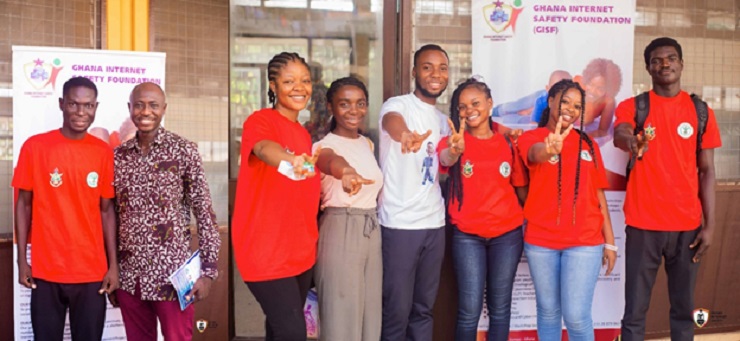Some participants in a pose after the training programme
The Kwame Nkrumah University of Science and Technology (KNUST) recently hosted a pivotal discussion on digital well-being, spearheaded by the Ghana Internet Safety Foundation (GISF) and KNUST Peer Counsellors.
This landmark workshop delved into the intricacies of the cyber world, emphasising resilience and mental health protection while promoting Online Protection and Safe Social Media Practices.
Distinguished speakers enriched the discourse with their expertise:
Dr. Tim McGuinness, a Board Director at SCARS, shed light on online threat dynamics, empowering counsellors with insights into predatory behaviours and scam mechanisms.
Dr. Tim McGuiness further urged that while it’s important to investigate suspicious activity, netizens’ safety should always be the top priority.
He called for the leveraging of our skills for the good of society than resorting to a life of cybercrime.
He emphasised that staying out of cybercrime remains critical and the best approach so far.
He shared some useful tips including,
“Tracing suspicious scams requires caution and expertise to avoid personal risk.
“Make efforts to verify sources and research the company or individual involved. Also look for reviews, complaints, and any history of scams associated with them.
“Look out for Official Websites. If the scam involves a government agency or organisation, verify their contact information and reach out directly through official channels,” among others.
On his part, Dr. Samuel Tinagyei, a cyber-trauma specialist from GISF, highlighted the psychological impacts of cyber threats and advocated integrating mental health support into cyber safety protocols.
While Daniel Ofori of the Cyber Crime Unit, Ghana Police Service, provided practical guidance on reporting cyber incidents and navigating legal procedures, Gabriel Ofori Appiah, the Director of GISF, emphasised the importance of digital literacy and respectful online conduct in creating inclusive and safe digital communities.
Emmanuel Adinkrah, President of GISF, introduced the innovative Cyber Clinic Helpline App, designed to offer swift reporting of harmful online content and access to mental health professionals.
Closing the workshop, Mr. Francis Anarfo, President of KNUST Peer Counsellors, expressed commitment to disseminating digital safety awareness. Mr. Cosmos Osei Kyere, KNUST Counsellor and KPC Coordinator, stressed the need for resources to support youth mental health.

